Tips for acing a reference letter this year
What do you need to know to write a reference letter? Follow our examples and tips to craft a convincing reference letter.
What do you need to know to write a reference letter? Follow our examples and tips to craft a convincing reference letter.
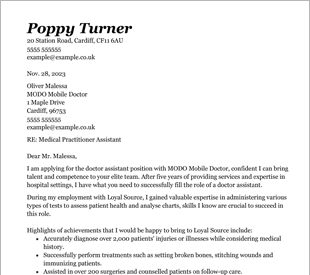
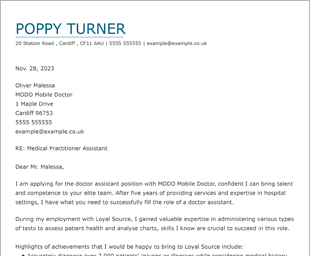
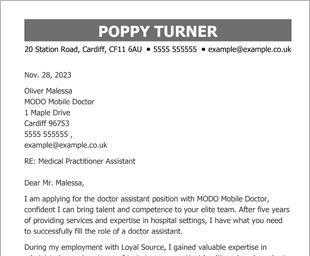
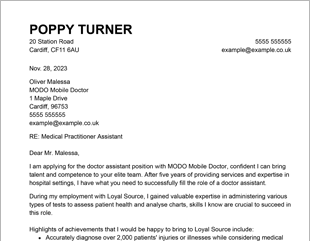
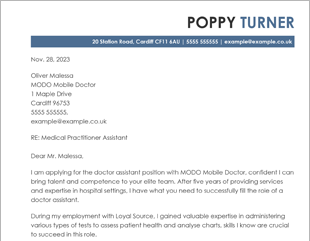
OUR USERS HAVE BEEN HIRED BY
When you apply for a job, maybe the employer has heard of you through their professional network, or through a mutual colleague, but they don’t really know the details about your professional background. So how do you set yourself apart? That’s where a reference letter comes in. This one-page document can help convince a recruiter or hiring manager that you are the perfect candidate for the role thanks to the endorsement or recommendation from a significant personal or professional contact.
This article will cover all the basics of reference letter writing and etiquette, whether you are requesting one or writing one. We will go over basic usage, the different types of reference letters, and the benefits these letters provide. We also have examples and a range of templates so that you can craft your letter to any job or recommendation situation.
A reference letter is a letter of endorsement or recommendation that can be provided by a personal or professional contact in order to support a job search. In most cases, a reference letter should be provided by someone relevant to your employment or education history. They should be someone who knows you personally and who has worked with you or supervised your work. Some jobs may require a specific type of reference letter which determines who you should ask and what the employer is actually looking for, like the following:
1. Professional reference letter: this is a document that a job candidate can use to support the claims made in other job application materials. It is specifically curated to the job so it would be beneficial for you to request a reference from:
2. Character reference letter: this letter differs from most business correspondence as it is focused on an applicant’s personal qualities and traits outside of the workplace. While tempting, asking friends or family members may not be the best option. If possible, get a character reference from a former colleague, someone you’ve volunteered with, or an academic connection so as to eliminate bias.
3. Academic reference letter: this is a document that details a student’s academic achievements, character, and goals and is usually required when a student is applying to a particular program or academic institution. For this type of letter, you should request a reference from:
If you have been asked to write a reference letter for a co-worker or previous employee, there are specific details you should include, such as how you know them and what key skills the applicant would bring to the program. When writing a reference letter, you should treat it as you would any other business letter (you can find business letter samples on CVHelp for inspiration), using professional language in a concise and clear way.
Choosing the right person to give you a reference is very important, but it’s also helpful when you reach out to someone in your professional network to provide them with an easy-to-follow sample reference letter will make it easier for them to create a document that will convince the company or institution that you have the desired skills, and make a great contribution immediately. Just use this example as a foundation for a good reference letter.
How you write a reference letter is important. If you follow this basic structure, you can create a good reference letter for the person who has requested it from you. It is always a good idea to start by requesting a copy of the person’s CV before you write the reference. This will help you to provide a detailed and relevant letter of recommendation. Here are the main components of a personal reference letter:
Unless you are writing the reference on the spot in response to an email or letter from a potential employer, it is unlikely you will know the name of the hiring manager or recruiter to whom the letter will be presented to. As such, a generic salutation such as “Dear Hiring Manager” or “To whom it may concern” will be sufficient. If you do know the person’s name, you should use the “Dear Mr.” or “Dear Miss/Mrs.” salutation and insert the recipient’s name.
The beginning of the letter usually starts immediately with a statement of recommendation as your hook. Something like “It’s my great pleasure to recommend [applicant] for this wonderful opportunity. They’ve been interested in [program/industry] for a very long time and have proven dedicated and hardworking in their pursuit of [job/subject].” then provide some professional authority by using the next few sentences to introduce yourself and your significance to the applicant.
Make it clear who you are in a professional capacity and how that relates to the applicant. Are you the applicant’s employer, teacher, or former supervisor? State that information and also any related networking or industry connections if applicable. If you were their former employer, you should note the period in which they worked for you. If you are providing a character reference letter, you should note how you came to know them and what your contact with them is. This will help the hiring manager to understand why you are able to credibly vouch for them.
Mention any skills and qualifications you can personally vouch for that will be relevant to the job application that your reference letter will support. Be honest but positive—a good recommendation letter should focus on the positive without bending the truth. If you feel you cannot be positive about the person who has asked for a reference, you should politely decline to provide one. Note the candidate’s best qualities and any actions or achievements that make them stand out in your mind. Try to give specific examples where you can. Don’t just cite good communication skills — give an example of a time when they produced a notable accomplishment or resolved a difficult situation in a quick narrative like so “[Applicant] helped my team meet regulatory requirements by coordinating documentation and filings along with QA-ing project proposals as my research assistant.”
In the closing paragraph of a professional reference letter, you should reiterate why you think the applicant would be a great fit for this job or program and offer to provide additional information and answer further questions if needed. Be sure to give your contact information (such as your phone number and email address) so the hiring manager can contact you if they need to.
This basic structure will allow you to write a good reference for the person who has requested one. If you need further guidance, you can always ask a friend or colleague to give you impartial feedback on the letter, as long as it doesn’t feature confidential information (just be sure to check with human resources if you are allowed to do so, or take steps to hide the identity of the person you are writing about when someone reviews the letter).
Considering hiring managers only have a few seconds to scan an applicant’s materials, having an easy-to-read and visually pleasing document is essential. When submitting a reference letter it’s important to keep these four factors in mind.
Using an easy-to-read font is a must. The standard is Times New Roman but you can use fonts in a similar family like Arial, Georgia or Calibri. It’s also important to keep the font size of your letter between 10 and 12 points. A font size of lower than 10 points will be challenging to read.
It’s important to write your letter in business standard or ‘block’ format, which creates a balance between content and white space. A standard letter is left-justified and single-spaced with a double space between paragraphs.
The side, top, and bottom margins should be one inch all the way around. Spacing and readability standards don’t just impact visual importance; they also can help you pass established keyword assessments by applicant tracking systems (ATS) by making your letter easy to scan. A professional CV template can also help you maintain standard margins while showing you visually reflect the culture of the company.
To sum up, the layout of the whole letter should be formatted for readability. Following standard business letter format, your letter should be double-spaced, with a clean, readable, 10 to 12-point font; and a one-inch margin all the way around. Check the requirements in the posting to make sure you are downloading or submitting in the right format. Letters are most commonly submitted as PDFs, but managers may request it in a Word document, plain text, or in another format.
If you’re looking to secure a reference letter for a particular job or program it’s important you ask someone you trust who has seen how you perform and knows how you work with others, like a former employer or teacher. It is important you think carefully about who you ask as you want to request the letter from someone who has worked closely with you so they can talk about your skills and qualifications from personal experience.
Here are three things to keep in mind when requesting a reference letter:
Pick references who are familiar with you and are willing to give you a positive recommendation while still remaining objective and reliable. The ideal requestee would be someone in your industry or a connection who has some familiarity with the program you’re applying for. Regardless, you should make a formal request for a reference and explain why you chose them. If they are willing, they will either provide a written reference or submit themselves to a character interview based on the application requirements.
Explain to your reference what the job is looking for, and give pointers on what will impress the employer like how you’ve managed a team, the research and craft you’ve put into a project (that the requestee was involved in), or if you’ve completed training for a particular program. Assuming you are provided with a reference letter, there are a number of things a hiring manager will look for no matter what job title you are applying for such as information about your skills and qualifications as well as information about or confirmation of your professional or academic achievements so make sure to confirm any application information with your requestee before submitting.
Be professional and thankful in your communication with your reference requestee as this person likely has their projects and is willing to take the time to help you with your application so being positive and grateful in your communication before and after your reference is submitted is a must.
If you want guidance for writing other business letters CVHelp has many resources to create business letters of all varieties. Check out these resources if you are looking for just the right way to impress a hiring manager with your enthusiasm about a position:
On average a reference letter should be one page or less in length. However, there is no defined length for a letter of reference. If your previous employer or academic reference provides a longer letter, it is not likely to be a problem and for some applications, they request you get more than one letter of reference so an overage of length shouldn’t be an issue.
Ideally, your reference letter should be written by a professional or person of authority who has had firsthand experience of your capabilities. If you can, you should make sure your referral contact is someone who has a good reputation in your industry. Depending on the details of your application academic advisers, volunteer leaders, and coaches can also be called upon for reference, but having a friend or family member write your letter isn’t recommended, as it may not be taken as seriously. Save your more personal relationships for personal or character references if your program requires a testimonial from someone outside your industry.
Reference letters are not always a necessity. However, if it is required in the job posting or if a recruiter or hiring manager specifically requests you to submit one, then having a professional reference letter or two at the ready is an easy way to increase your chances of success. This type of letter, especially because it can provide a level of impartial insight, can help the employer make the distinction between you and another qualified applicant.
A reference letter is a general endorsement or commendation of a person that confirms the required abilities or stated facts. It also proves that the writer knows you personally and can verify certain facts about you and your performance. Generally stands alone as a show of approval to be used as needed.
A recommendation letter highlights or emphasises skills, knowledge, and experiences that qualify the candidate for a specific opportunity. Such as a particular role within a company or a specific scholarship, program, etc. Hence the skills and experiences verified or referenced will pertain to the requirements of the company or organisation.
A good reference letter will establish credibility by having a figure of authority focus on and verify your accomplishments, contributions, motivation, attitude, and reliability. To do this, the person you chose to request a letter from must have some degree of objectivity, as someone with a close personal relationship could be judged to be biased. Thus, if you are asked to write a letter of reference it is important to state how you know the candidate, and in what professional capacity, before you begin discussing any positive personal qualities (with specific examples). Your recommendation will then hold more value.
Professional references, usually requested during the application process for an academic position or advanced career work, are a type of person who, while significant to you in some way, can provide a professional and impartial view of your character. Typically, a professional reference is a former employer, client, colleague, teacher, or supervisor. It should be someone with the authority to vouch for your qualifications for a job based on their insight into your work ethic, skills, strengths, and achievements.
Here are some suggestions for who you should request a reference letter from if needed:
We personalize your experience.
We use cookies in our website to ensure we give you the best experience, get to know our users and deliver better marketing. For this purpose, we may share the information collected with third parties. By clicking “Allow cookies” you give us your consent to use all cookies. If you prefer to manage your cookies click on the “Manage cookies” link below.